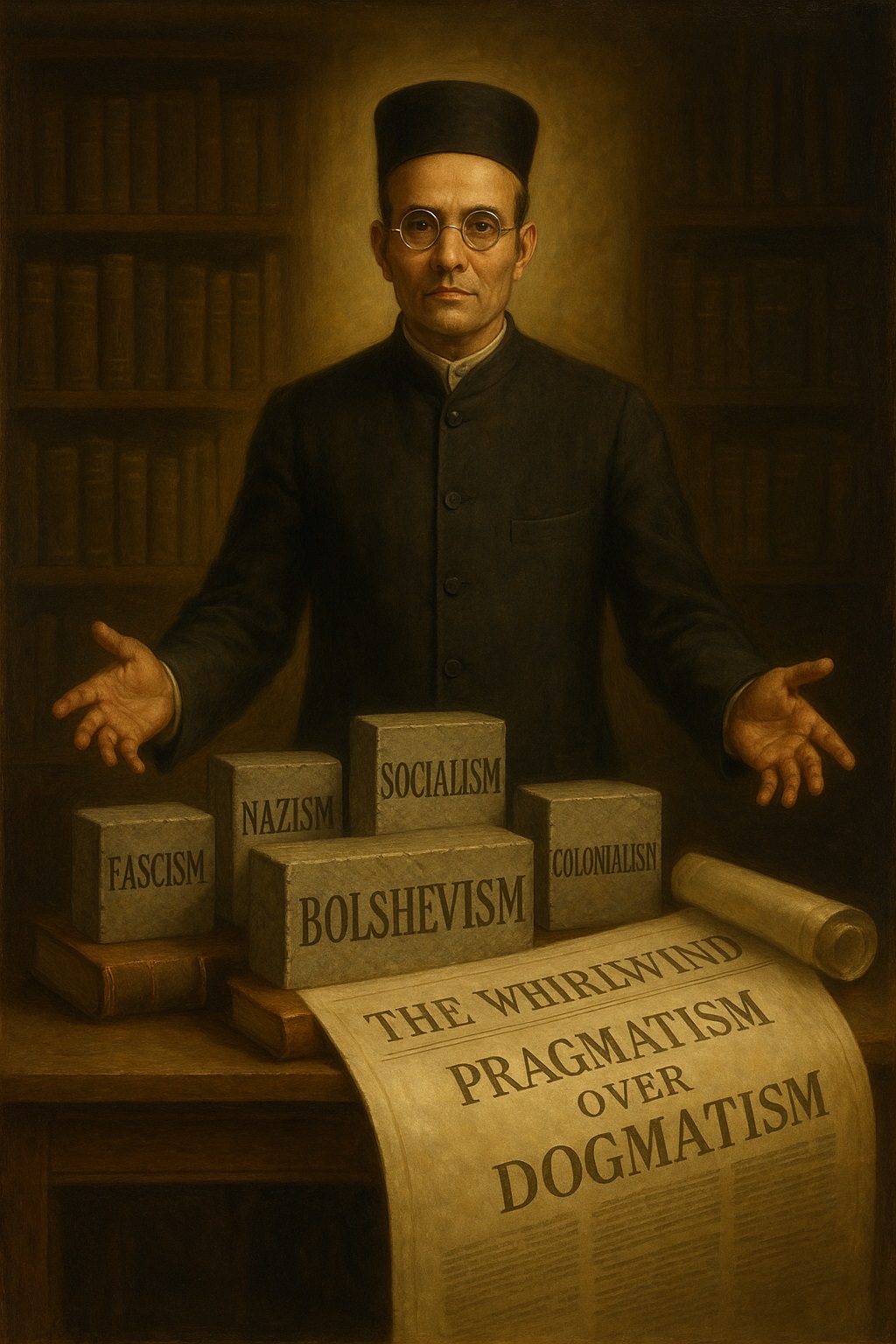Political Dimension of Hindutva, Part 3
One of the most defining aspects of Vinayak Damodar Savarkar’s political and social thought is his categorical rejection of rigid, doctrinal frameworks – whether political or religious (Savarkar 1941:50ff; 1999:52). He distances himself from any ideology or movement that is characterized by the suffix “isms”, believing that such rigid structures limit a nation’s ability to adapt and evolve.
Savarkar’s Approach to Political and Religious Ideologies
Savarkar’s skepticism towards ideological dogmatism is evident in his interpretation of history and the evolving relationship between Hindus and other religious communities in India. He warns against allowing political “isms” to dictate India’s postcolonial governance, emphasizing that the country’s political institutions should be shaped based on practical needs rather than foreign ideological influences. However, this does not mean that he is without ideological preferences. Instead, his rejection of rigid doctrines stems from a desire to maintain ideological flexibility in shaping India’s future.
Savarkar’s core belief is that no single form of government or political ideology is inherently good or bad in all circumstances (Savarkar 1941:51). Political systems must be evaluated based on their effectiveness in serving the people. He argues that just as Italy embraced Fascism, Germany National Socialism, Russia Bolshevism, and Britain Democracy, India must have the right to determine its own path without external pressures.
Political Pragmatism Over Ideological Rigidity
Savarkar’s philosophy aligns with a pragmatic approach, where the success of a political ideology is measured by its impact on the state and its people. He warns against blindly accepting ideologies based on moral or philosophical preferences, arguing instead that nations should assess the tangible benefits and drawbacks of any political system before adopting it. By emphasizing an “ideological right to self-determination,” he affirms India’s sovereignty in choosing its governance model based on its specific needs (Savarkar 1941:51).
This perspective also reflects his broader resistance to external influences—whether from colonial rulers or prevailing global ideological trends. Savarkar asserts that India’s political system should be designed by Indians, for Indians, without being dictated by global ideological movements.
The Role of Hindutva in Governance
Against this backdrop, Savarkar insists that all political decisions – whether in domestic or foreign policy – should serve the interests of Hindutva. He strongly opposes allowing external ideological slogans such as Democracy, Nazism, or Fascism to dictate Hindu politics (Savarkar 2007:259ff). His position underscores the need for India to remain independent in its political decision-making, resisting both colonial hangovers and ideological pressures from foreign movements.
Final Thoughts – Pragmatism and Ideological Flexibility in the National Interest
Savarkar’s rejection of rigid “isms” does not imply a lack of principles but rather a commitment to pragmatism and national interest. He believes that India must remain free to choose its own political path based on what best serves its people, rather than conforming to global ideological trends. His advocacy for ideological flexibility ensures that governance is dictated by practical needs rather than abstract doctrines, reinforcing the fundamental right of self-determination for nations.
Savarkar’s vision challenges us to rethink the role of ideologies in shaping governance and to prioritize national interests over imported doctrines. In a rapidly changing world, his emphasis on adaptability and self-reliance remains as relevant as ever.
Sources:
SAVARKAR, Vinayak Damodar. 2007. Hindu Rashtra Darshan. Bharat Bhushan. Abhishek Publications: New Delhi.
SAVARKAR, Vinayak Damodar. 1999. Hindutva: Who is a Hindu. Seventh Edition. Swatantryaveer Savarkar Rashtriya Smarak: Mumbai.
SAVARKAR, Vinayak Damodar. 1941. Whirlwind propaganda: Statements, messages and Extracts from the President’s Diary of his Propagandistic Tours, Interviews from December 1937 to October 1941, (Ed. by A. S. Bhide, Bombay).


Leave a Reply